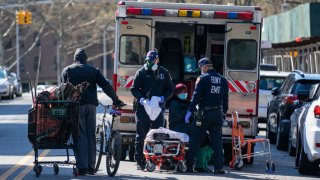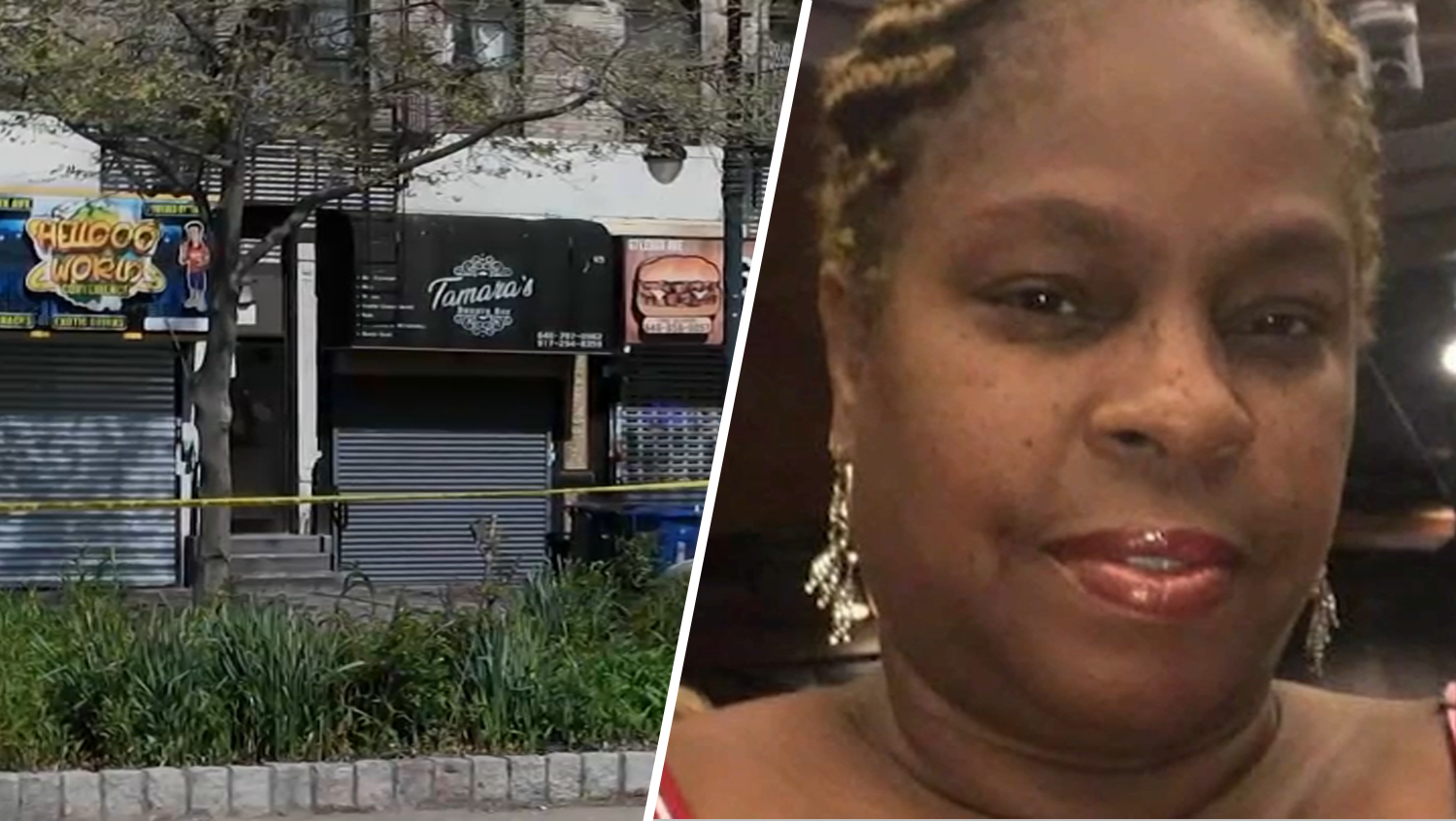
NEW YORK, NY – APRIL 16: A person is helped into an ambulance by EMT workers on April 16, 2020, in the Bronx borough on New York City. During his daily news briefing on Thursday, New York City Mayor Bill de Blasio proposed $2 billion in budget cuts beginning July 1 to balance the city’s budget amid the coronavirus pandemic. The mayor also called upon President Trump to push for Congress to provide more stimulus funds to state and local governments.(Photo by David Dee Delgado/Getty Images)
New York City police will stay out of many mental health crisis calls and social workers will respond instead in parts of northern Manhattan starting this spring, an official told lawmakers Monday.
The test program will begin in three Harlem and East Harlem police precincts that together accounted for a highest-in-the-city total of over 7,400 mental health-related 911 calls last year, said Susan Herman, who heads a wide-ranging city mental health initiative called ThriveNYC.
The details fleshed out a plan the city outlined broadly in November, aiming to keep psychiatric crises from escalating into confrontations and to provide people with more health-focused help.
Watch NBC 4 free wherever you are
The experiment “will be a critical step forward in the city’s commitment to treat mental health crises as public health problems, not public safety issues,” Herman told a City Council committee. She said the city hopes to make the program citywide as quickly as possible, a hope she shares with Mayor Bill de Blasio, who called the new policy "the way of the future" and plans to build it out into 2022.
"If you have a call, a family in distress, someone with a mental health challenge, there's no history of violence, there's no weapon present — that's a call that should be handled by civilians, folks with the right training, mental health abilities, go in there and help that family," de Blasio said in an interview Monday night. "So much we're talking about — homelessness, incarceration, dropout rates — so many things came back to mental health challenges. So, we're making a fundamental investment here to say let's change how we approach it, and then the NYPD can take that time and energy that's freed up and focus it on the things that they do the best, which is to protect public safety in general. That balance needs to be re-struck."
Get Tri-state area news delivered to your inbox with NBC New York's News Headlines newsletter.
Some important specifics remain to be seen in practice, including how real-time decisions about when to summon police — who will still respond to calls involving a weapon or “imminent risk of harm” — will play out. And the union that represents the city’s EMTs says the city needs to make sure they’re safe before going ahead.
Mental health advocates have hailed the idea but expressed some reservations about how the city is structuring it.
News
“Trying to move away from the police being the first responders in a mental health crisis is a step in the right direction,” said Cal Hedigan, CEO of a mental health organization called Community Access. But she wishes the response teams would include people who have had mental illness and are trained to help others.
Otherwise, “you run the risk of replacing one flawed system with another that doesn’t have an important element,” Hedigan said.
Calls for changing how authorities respond to people in distress have resounded across the country amid cases such as that of Daniel Prude, a Black man who died after police in Rochester put an anti-spitting hood over his head and restrained him to the ground while he was having a mental health crisis in March. This month, a 9-year-old Black girl ended up being handcuffed and pepper sprayed after police responded to a domestic situation called in by her mother and the girl became emotional.
Some other U.S. cities, including Denver and San Francisco, have recently replaced or planned to replace police with mental health professionals in some situations. Eugene, Oregon, has had one for decades.
In New York City, police and EMTs responded to all 154,000 calls to 911 for emergency behavioral health help last year. Nearly half ended with someone being hospitalized; fewer than 1 in 100 resulted in arrests, police officials told the council committee.
The new test program will dispatch teams of two Fire Department EMTs and one social worker each, available 16 hours a day, Herman said.
The New York Police Department is working with ThriveNYC “to ensure that the appropriate agency responds to people in mental health crisis,” police spokesperson Al Baker said in a statement.
Herman said hiring was under way for the new program, and it would start as soon as the needed staffers were hired and trained.
The Fire Department has expressed support for the test program and declined to comment further on Monday.
But Oren Barzilay, the head of the EMT union known as Local 2507 for short, said that “before any plan moves forward, we must ensure the safety and security of our workforce.”



